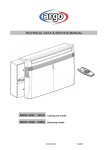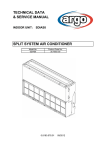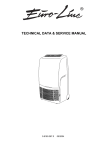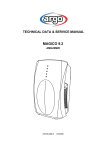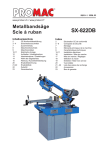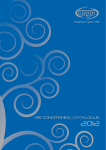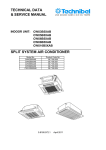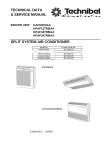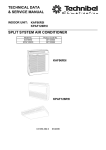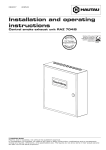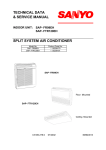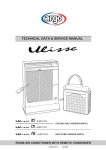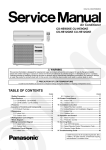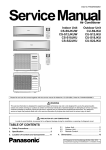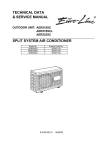Download TECHNICAL DATA & SERVICE MANUAL
Transcript
TECHNICAL DATA & SERVICE MANUAL ULISSE 13PCLA AUG38PCLI Model No. AUG38PCLI 0.8180.516.0 Product Code No. 39.7028.942 11/2006 IMPORTANT! Please read before installation This air conditioning system meets strict safety and operating standards. For the installer or service person, it is important to install or service the system so that it operates safely and efficiently. For safe installation and trouble-free operation, you must: • Carefully read this instruction booklet before beginning. • Follow each installation or repair step exactly as shown. • Observe all local, state and national electrical codes. • Pay close attention to all warning and caution notices given in this manual. •The unit must be supplied with a dedicated electrical line. • Ground the unit following local electrical codes. • The Yellow/Green wire cannot be used for any connection different from the ground connection. • Connect all wiring tightly. Loose wiring may cause overheating at connection points and a possible fire hazard. • Do not allow wiring to touch the refrigerant tubing, compressor, or any moving parts of the fan. • Do not use multi-core cable when wiring the power supply and control lines. Use separate cables for each type of line. When transporting Be careful when picking up and moving the indoor and outdoor units. Get a partner to help, and bend your knees when lifting to reduce strain on your back. Sharp edges or thin aluminium fins on the air conditioner can cut your fingers. WARNING This symbol refers to a hazard or unsafe practice which can result in severe personal injury or death. When installing... … In a ceiling Make sure the ceiling is strong enough to hold the unit-weight. It may be necessary to build a strong wooden or metal frame to provide added support. … In a room CAUTION This symbol refers to a hazard or unsafe practice which can result in personal injury or product or property damage. Properly insulate any tubing run inside a room to prevent "sweating", which can cause dripping and water damage to walls and floors. ... In moist or uneven locations If necessary, get help These instructions are all you need for most installation sites and maintenance conditions. If you require help for a special problem, contact our sale/service outlet or your certified dealer for additional instructions. Use a raised concrete base to provide a solid level foundation for the outdoor unit. This prevents damage and abnormal vibrations. ... In area with strong winds Securely anchor the outdoor unit down with bolts and a metal frame. Provide a suitable air baffle. In case of improper installation The manufacturer shall in no way be responsible for improper installation or maintenance service, including failure to follow the instructions in this document. ... In a snowy area (for heat pump-type systems) SPECIAL PRECAUTIONS When connecting refrigerant tubing • During installation, connect before the refrigerant system and then the wiring one; proceed in the reverse orden when removing the units. • Keep all tubing runs as short as possible. • Use the flare method for connecting tubing. • Apply refrigerant lubricant to the matching surfaces of the flare and union tubes before connecting them; screw by hand and then tighten the nut with a torque wrench for a leak-free connection. • Check carefully for leaks before starting the test run. WARNING When wiring ELECTRICAL SHOCK CAN CAUSE SEVERE PERSONAL INJURY OR DEATH. ONLY QUALIFIED, EXPERIENCED ELECTRICIANS SHOULD ATTEMPT TO WIRE THIS SYSTEM. • Do not supply power to the unit until all wiring and tubing are completed or reconnected and checked, to ensure the grounding. • Highly dangerous electrical voltages are used in this system. Carefully refer to the wiring diagram and these instructions when wiring. Improper connections and inadequate grounding can cause accidental injury and death. 2 Install the outdoor unit on a raised platform that is higher then drifting snow. Provide snow vents. NOTE: Depending on the system type, liquid and gas lines may be either narrow or wide. Therefore, to avoid confusion, the refrigerant tubing for your particular model is specified as narrow tube for liquid, wide tube for gas. When servicing • Turn the power OFF at the main power board before opening the unit to check or repair electrical parts and wiring. • Keep your fingers and clothing away from any moving parts. • Clean up the site after the work, remembering to check that no metal scraps or bits of wiring have been left inside the unit being serviced. • Ventilate the room during the installation or testing the refrigeration system; make sure that, after the installation, no gas leaks are present, because this could produce toxic gas and dangerous if in contact with flames or heat-sources. Table of Contents Page 1. SPECIFICATIONS 1-1 Unit specifications 1-2 Major Component specifications 1-3 Other Component specifications 4 4 5-6 6 2. DIMENSIONAL DATA 2-1 Unit Dimensions 7 7 3. REFRIGERANT FLOW DATA 3-1 Refrigerant Flow Diagram 8 8 4. ELECTRICAL DATA 4-1 Electric Wiring Diagram 9 9 5. PERFORMANCE DATA 5-1 Performance Chart 10 10 6. FUNCTIONS 6-1 Cool Mode Operation 6-2 Dry Mode Operation 6-3 Fan Mode Operation 6-4 Auto Fan Speed 6-5 Forced Mode 6-6 Protection Operation in Cool and Dry Mode 6-7 I FEEL Function 6-8 NIGHT Function 6-9 Drain Pump 11 11 12 12 12 13 13 14 14 14 7. DIAGNOSTIC 15 8. JUMPERS CONFIGURATION 16 9. MAINTENANCE 17 10. TROUBLESHOOTING 18-25 11. CHECKING ELECTRICAL COMPONENTS 26-27 3 1. SPECIFICATIONS 1-1 Unit Specifications AUG38PCLI 230 V ~ 50 Hz Power Source Voltage Rating V 230 Available Voltage Range V 198 - 264 Running Ampere A 5,60 W 1245 Power Input 0,96 Power Factor Performance Capacity Features Controls / Temperature Controls Control Unit Timer Fan Speed Indoor / Outdoor Unit Airflow Direction Vertical Orizzontal Air Filter Compressor Refrigerant Gas Refrigerant Standard Charge at Shipment Refrigerant Control Condensate Drain System Net Weight 13640 4,00 400/375/335 1,90 55/54/52 62 BTU/h kW m³/h l/h dB-A dB-A Air Circulation High/Med./Low Moisture Removal High Speed Power Noise Level Indoor Unit (1) High/Med./Low Power Noise Level Outdoor Unit (1) Outdoor Unit 35 A Compressor Locked Rotor Amperes Dimensions & Weight Indoor Unit 3,21 W/W C.O.P. g Height Width Depth Height Width Depth Internal Unit External Unit Microprocessor / I.C. thermostat Wireless remote control ON/OFF 24 Hours & Daily Program 3 and Auto / 1 Manual Manual Washable/ Easy Access Rotary (Hermetic) R410A 1150 Capillary Tube Automatic with Pump 790 mm 580 mm 245 mm 490 mm 525 mm 250 mm 44 kg 15 kg DATA SUBJECT TO CHANGE WITHOUT NOTICE NOTE Rating Cooling Conditions: - Outside Air Temperature: - Inside Air Temperature: 35°C DB 27°C DB, 19°C WB (1) Reference data: room size 100 m³, reverberation time 0,5 s, distance 2 m. 4 1-2 Major Component Specifications AUG38PCLI Controller PCB Model Controls Control Circuit Fuse (F1) Jumper Setting JP1 … JP5 SAC ON-OFF IDU Microprocessor 250VAC - 3,15A - T 2,54mm - 5 pcs SAC WREM Remote Control Unit Thermistor Coil Sensor Resistance at 25°C kΩ NTC (with Brass Pipe) 10 ± 3% Thermistor Room Sensor (TH Room) Resistance at 25°C kΩ 10 ± 5% Fan Motor Indoor Unit (FMI) Model Number / Diameter / Length No. Of Pole - RPM High/Med./Low (230V) Nominal Input Coil Resistance at 25°C Safety Device Setting mm W Ω Ω Ω Ω Operating temp. Open Close Run Capacitor (C) µF VAC Fan Motor Outdoor Unit (FMO) Model Diameter No. Of Pole / RPM (230V) Nominal Input Coil Resistance at 25°C Safety Device Setting W cc cc Ω Ω µF VAC Rotary (Hermetic) 80235455 3680 --520 *C-R : 2402 *C-S : 3582 30 450 W Ω Ω Operating temp. Open Close Compressor Model Nominal Cooling Capacity Compressor Oil: RB68A or Freol Alpha68M Compressor Oil: DAPHNE FV68S or equivalent Coil Resistance at 20°C *at 25°C Run Capacitor (C) Overload Relay (OLR) Operating Temperature µF VAC K35610-MO1525 Ø 340 6 / 885 75 BLU-BRN: 230 ± 5% BLU-BLK: 243 ± 5% Internal Bimetallic Type 150 ± 5 Autoreset 2,5 450 mm Run Capacitor (C) Short Time Trip °C Open Close 6-16 Sec. At 25°C 5 K35406-MO2024 Cross-Flow / Ø 100 / 410 4 - 1350/1275/1165 27 GRY-WHT: 545 ÷ 630 ± 5% WHT-VLT: 92 ÷ 105 ± 5% VLT-ORG: 62 ÷ 71 ± 5% GRY-BRN: 78 ÷ 90 ± 5% Internal Bimetallic Type 150 ± 10 Autoreset 2,00 440 °C °C °C A External 150 ± 5% 69 ± 11% 23,5 DATA SUBJECT TO CHANGE WITHOUT NOTICE AUG38PCLI Condensate Pump Model Rating Nominal Input Coil Resistance at 20°C Safety Float Switch Model Contact Rating Float W Ω Up Down Heat Exchanger Coil (Evaporator) Coil Rows Fin Pitch Face Area mm m² Heat Exchanger Coil (Condenser) Coil Rows Fin Pitch Face Area PC 95643 230V - 50Hz 12 ± 10% 122 ± 10% F83161,3 10(4)A - 250VAC Open Close Alluminium Plate Fin / Copper Tube 2 1,8 0,185 Alluminium Plate Fin / Copper Tube 3 1,6 mm 0,3 m² DATA SUBJECT TO CHANGE WITHOUT NOTICE 1-3 Other Component Specifications OPERATING RANGE Indoor Air Intake Outdoor Air Intake Temperature Temperature 32°C DB / 23°C WB 46°C DB 19°C DB / 14°C WB 19°C DB 32°C BS / 80% R.U. 43°C DB 16°C BS / 80% R.U. 16°C DB DATA SUBJECT TO CHANGE WITHOUT NOTICE Temperature Cooling Dry Maximun Minimun Maximun Minimun 6 2. DIMENSIONAL DATA 2-1 Unit Dimensions A E C B D AUG38PCLI A B C D E F 790 580 245 525 490 250 7 F 3. REFRIGERANT FLOW DATA 3-1 Refrigerant Flow Diagram 8 4. ELECTRICAL DATA 4-1 Electric Wiring Diagram PCB FMI CM OLR FMO C DP Controller Indoor fan motor Compressor motor Overload relay Outdoor fan motor Capacitor Drain Pump SWITCH IND TH TP FS 9 Switch Assy Indicator assy Thermistor Terminal plate Float switch 5. PERFORMANCE DATA 5-1 Performance Chart Operation characteristics with relative humidity around 50%. OPERATING CURRENT (A) AUG38PCLI 9 8 32 °C 27 °C 21 °C 7 6 5 20 25 30 35 40 EXTERNAL TEMPERATURE (°C) 10 45 50 6. FUNCTIONS 6-1 Cool Mode Operation In Cooling Mode, the operation of the compressor (CM), Outdoor Fan (FMO) and Indoor Fan (FMI) are determined by the difference between the room air temperature (RAT) and the set point temperature (SPT) as shown in the graph. NOTES 1. In this graph, the FMI is operating with the “Auto Fan Speed” setting. If the user has selected the Low, Medium or High fan speed, the FMI will run constantly at that speed only. 2. In addition to the temperature difference of above, the operations of the main components (CM, FMO, FMI) is also controlled by protection delays. That is: - the minimum off time of compressor is 3 minutes. - the minimum off time of compressor is 3 minutes. - the indoor fan can change speed only after it has operated at the same speed for 30 sec if in AUTO and 1 sec for the other settings (High, Med, Low). 11 6-2 Dry Mode Operation Dry operation remove moisture from indoor air running, in cooling mode, at a low level without reducing the ambient temperature. This is done cycling ON and OFF indoor and outdoor units according to below. ROOM TEMPERATURE DRY LEVEL ≥ SPT+2°C LEVEL 0 < SPT+2°C ≥ SPT-1°C LEVEL 1 < SPT-1°C ≥ 15°C LEVEL 2 < 15°C DRY OFF ZONE Operation according to COOLING mode CM ON FMO ON FMI switches between L and OFF (30 seconds) CM switches 9 minutes OFF and 3 minutes ON FMO switches 9 minutes OFF and 3 minutes ON FMI switches OFF and L during CM operation CM OFF FMO OFF FMI OFF SPT = Set Point Temperature 6-3 Fan Mode Operation With this mode, the indoor fan is turned ON while CM and FMO stay OFF all the time. The user can select between 4 speeds: HIGH, MEDIUM and LOW. 6-4 Auto Fan Speed With this option selected, the indoor fan speed changes automatically according to the difference between the detected air temperature (RAT sensor) and the set point (SPT): COOLING MODE 2 ≤ (RAT – SPT): 1 ≤ (RAT – SPT) < 2: (RAT – SPT) < 1: HIGH speed MEDIUM speed LOW speed NOTE SPT = Set Point Temperature 12 6-5 Forced Mode In this mode the system operates (COOLING or HEATING mode – fixed settings) or is switched off by means of the MODE button of the indoor unit control board. The operation modes can be selected pressing the button in a cyclic way (OFF COOL HEAT OFF…). The settings are: COOLING mode SET POINT temperature = 25°C FAN SPEED = HIGH 6-6 Protection Operations in Cool and Dry Mode Freeze-up This protection prevents ice formation on the indoor coil heat exchanger. The protection is activated by the indoor coil temperature (ICT sensor) and only after 6 minutes of compressor operation. This protection acts in 2 levels: LEVEL 1 INDOOR FAN SPEED: ANY (as selected from remote controller) COMPRESSOR: ON OUTDOOR FAN: cycling (30 seconds ON B 30 seconds OFF). DRAIN PUMP: operates according to paragraph 9.2 LEVEL 2 INDOOR FAN SPEED: ANY (as selected from remote controller) COMPRESSOR: OFF for at least 6 minutes and until ICT ≥ 8°C OUTDOOR FAN: OFF for at least 6 minutes and until ICT ≥ 8°C DRAIN PUMP: always ON ( stops when exiting the protection) The system exit this protection routine when ICT temperature rises above 8°C. 13 6-7 I FEEL Function As standard configuration the air conditioner operates detecting the room temperature through the sensor equipped in the wireless remote controller (icon I FEEL shown on the display). This feature provides a personalised environment since the temperature can be detected where the remote controller is located. It is possible to de-activate this option pressing the I FEEL button on the remote controller. In this case the I FEEL icon is no longer displayed and room temperature is detected through the sensor included in the indoor unit. 6-8 NIGHT Function When this function is active, room temperature changes automatically to compensate for body temperature variations while sleeping. After 10 hours of operation system switches automatically to OFF state. This mode of operation is available both in COOLING and HEATING mode. When running in this mode indoor fan is automatically switched to LOW speed. 6-9 DRAIN PUMP Pump operates when the unit is running in COOLING and DRY modes. The level detection is done through a float switch connected at the input FS (closed under normal condition, and opened when water overflow). System operation is according to the following chart: FS Contact 30sec 20sec 30sec 20sec 14 7. DIAGNOSTIC With this feature is possible to have a visual signal that a trouble is occurring. This mode is always active and the signalling is made through the display board LEDS . In case of no troubles the LEDS status follows its normal function. NOTES The troubles are showed according a priority list that is in case of more than one trouble present, is always showed, at first, the one with the highest priority (1 2 3 etc). Sensor damaged means a situation where sensor is short-circuited or opened. In case of damaged sensors, the system (CM, FMO, FMI etc), if in OFF state, does not start. WRONG MODE SELECTED means a situation where the operating mode chosen with remote controller does not comply with the one allowed by jumpers settings. Priority 1 2 3 4 5 LEDS status TROUBLE No parameters RAT damaged ICT damaged WRONG MODE SELECTED Water level alarm Effects LD1(stby) LD2(opr) LD3(timer) z F F F F O F F O O O F O F O O = LED off z = LED on F = LED blinking 15 System does not operate See paragraph 6-9 DRAIN PUMP 8. JUMPERS CONFIGURATION Jumpers are located on the indoor PCB near the MODE button. Unit is shipped with jumpers set according to the following table: JUMPER STATUS JP1 open JP2 closed JP3 open JP4 closed JP5 closed 16 9. MAINTENANCE Changing the Address of the Air Conditioner In case of more than one air conditioner operating in the same room, it may be necessary to assign an address to each unit in order to avoid operation conflicts. Address is set acting on the dip-switches located on the indoor PCB and on the remote controller. The PCB settings must match the corresponding ones on the wireless remote controller. How to change address of the air conditioner Dip switch is located on the indoor PCB near the buzzer. Set the PCB to the address desidered UNIT ADDRESS 1 2 3 4 SETTINGS SW1 SW2 off off off on on off on on As default switches SW1 and SW2 are in off status (PCB factory state). How to change address on Remote Control Unit Dip switch is located on the battery compartment. 1) Pull out the door and remove the batteries. 2) Set the switch SW1 and SW2 according to the indoor PCB settings (do not act on SW3 and SW4) 3) Insert the batteries and pull on the door As default switches SW1 and SW2 are in off status (remote controller factory state). 17 10. TROUBLESHOOTING CHECK BEFORE AND AFTER «TROUBLESHOOTING» (A) Check power supply wiring. • Check the power supply wires are correctly connected. (B) Check power supply. • Check that voltage is in specified range (±10% of the rating). • Check that power is being supplied. • WARNING: If the following troubleshooting must be done with power supplied, be careful not to touch any uninsulated live part that can cause ELECTRIC SHOCK. A CIRCUIT BREAKER TRIPS OR FUSE BLOWS. • When circuit breaker is set to ON, it trips in a few moments. Resetting is not possible. • Measure insulation resistance. There is a possibility of ground fault. If resistance value is 1 Mohm or less, insulation is defective. B CIRCUIT BREAKER TRIPS IN SEVERAL MINUTES AFTER TURNING AIR CONDITIONER ON. 1 • There is the possibility of short circuit. 18 2 • The unit does not run. C WATER LEVEL ALARM - OPERATION LAMP IS BLINKING. Malfunctioning of the condensate drainanege system. NOTE: In case of emergency the air conditioner can work by draining the condensate from the little pipe into a rather short container. Extract the little pipe and remove the cap. 19 D UNIT AND COMPRESSOR DO NOT RUN. The unit does not run when air conditioner is in the follwing conditions: • When the room temperature is below the setting temperature. • During the protection modes. 20 E SOME PARTS OF THE AIR CONDITIONER DO NOT OPERATE. 21 F AIR CONDITIONER OPERATES, BUT ABNORMALITIES ARE OBSERVED. 22 23 G POOR COOLING OR HEATING. 24 H EXCESSIVE COOLING OR HEATING. I A SENSOR IS DEFECTIVE. 25 11. CHECKING ELECTRICAL COMPONENTS 26 27 Via Varese, 90 - 21013 Gallarate - VA - Italy Tel. +39 0331 755111 - Fax +39 0331 776240 www.argoclima.com




























